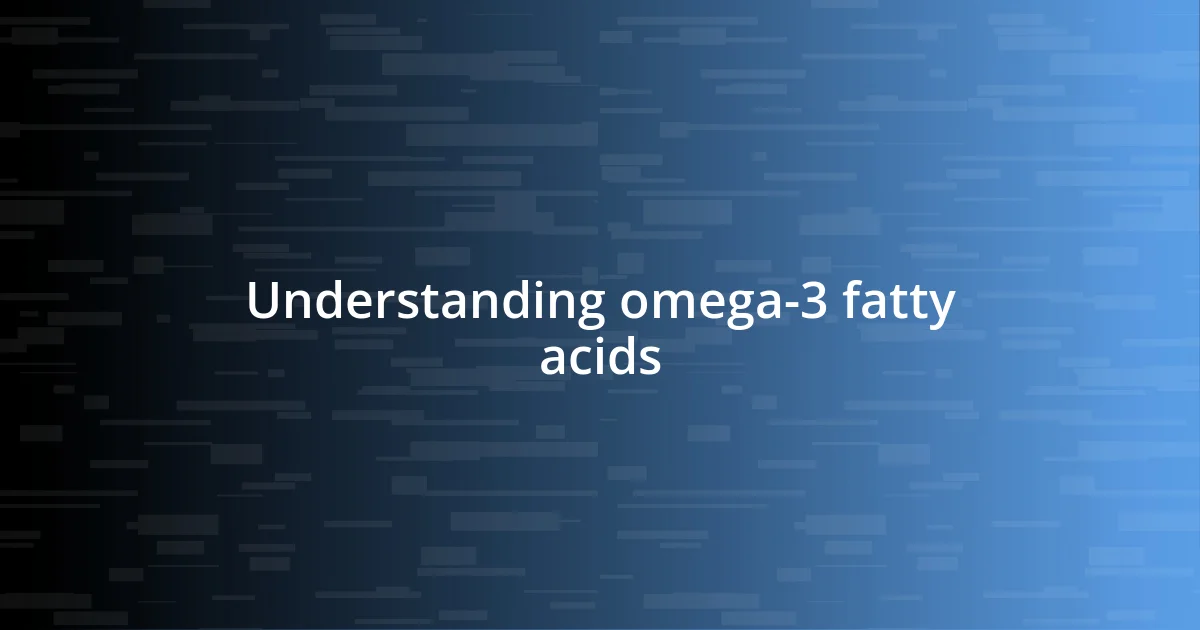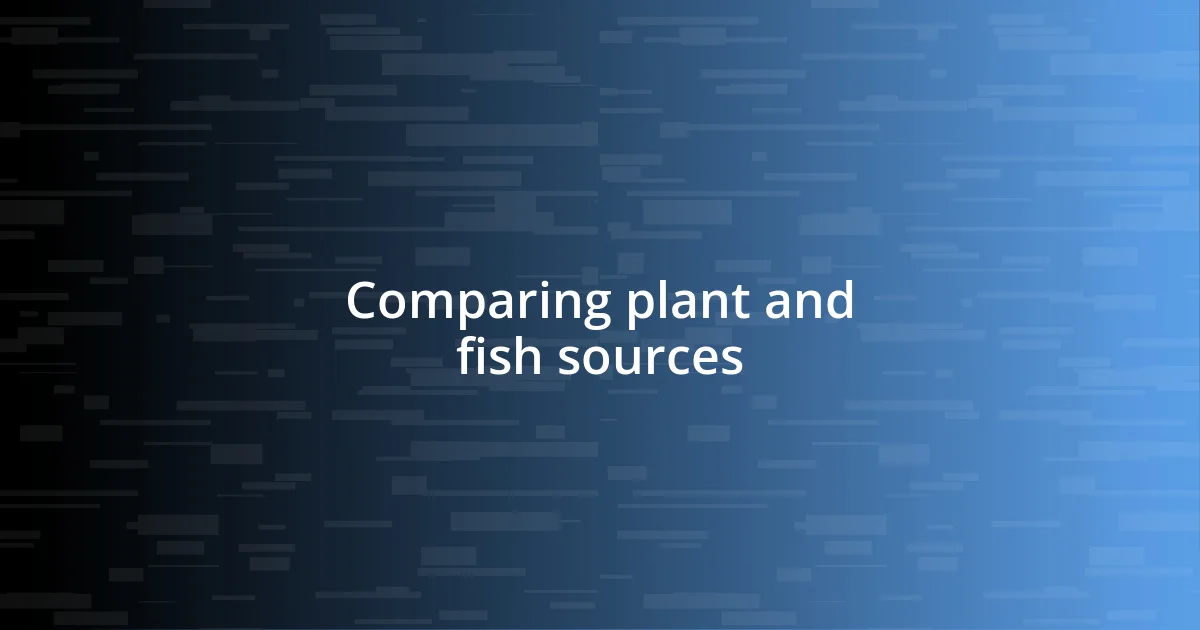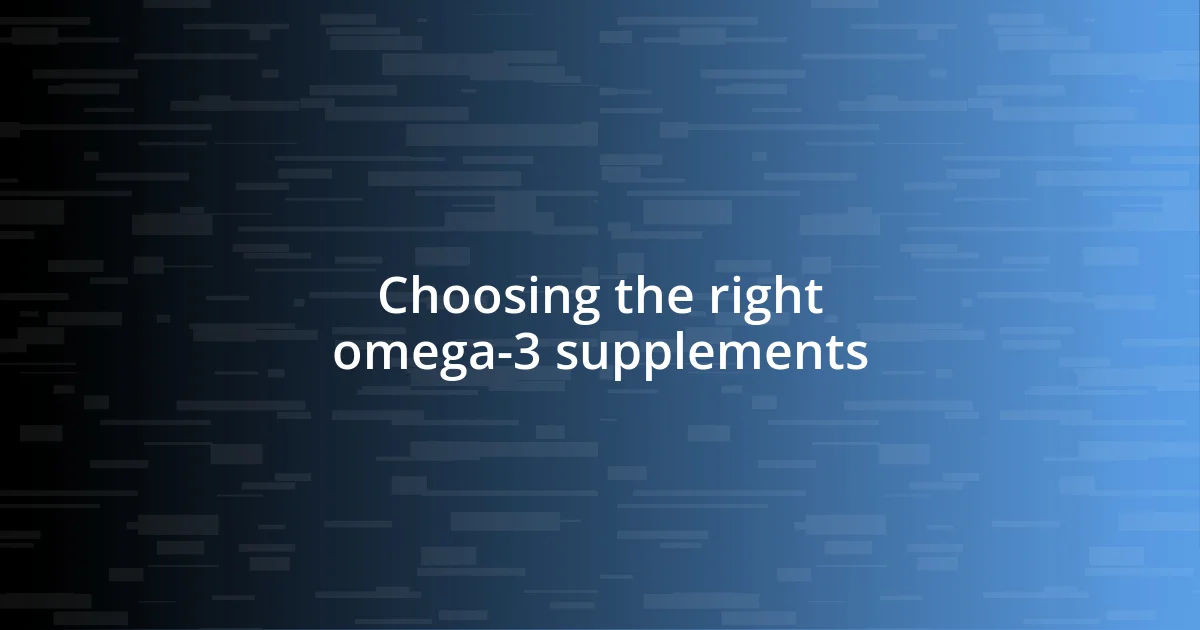Key takeaways:
- Omega-3 fatty acids are essential for health, with various forms (ALA, EPA, DHA) obtained from both fish and plant sources, each offering unique benefits.
- Regular consumption of omega-3s has been linked to improved heart health, enhanced brain function, and better mental well-being, including reduced anxiety and depression symptoms.
- Incorporating whole food sources of omega-3s, along with proper supplement selection, is crucial for maximizing health benefits and dispelling common misconceptions about their sources.

Understanding omega-3 fatty acids
Omega-3 fatty acids are essential fats that our bodies can’t produce on their own, which means we need to seek them out through our diet. I remember the first time I learned about these tiny powerhouses—I was intrigued by the idea that something so small could have such a significant impact on our health. Have you ever stopped to think about how many functions they play in our bodies? From supporting heart health to boosting brain function, the benefits are impressive.
One of the fascinating aspects of omega-3s is how they come in different forms: ALA, EPA, and DHA. I find it intriguing how ALA is primarily found in plant-based sources like flaxseeds and walnuts, while EPA and DHA are often associated with fish and algae. It’s like a puzzle to me, discovering how these different types contribute uniquely to our well-being and how incorporating a variety of sources can enhance our overall health.
When I think about the emotional connection I have with foods rich in omega-3s, I can’t help but reminisce about family dinners where salmon was the star of the table. Those meals were not only nourishing, but they also sparked heartfelt conversations and memories. Isn’t it amazing how food can connect us while simultaneously providing essential nutrients? By understanding omega-3 fatty acids, we can make more informed choices that benefit our health and enrich our lives.

Health benefits of omega-3
The health benefits of omega-3 fatty acids are truly remarkable. Research shows that they play a crucial role in reducing inflammation, which can lead to improved heart health. I remember a time when I noticed a significant difference in my joint discomfort after consistently incorporating omega-3-rich foods into my diet. It’s like finding a missing key that unlocks a more comfortable life.
Moreover, omega-3s are known to support brain function, enhancing memory and cognitive performance. I’ve often turned to fatty fish when studying for exams or working on creative projects, and it seems to make a difference. Have you ever felt that boost in focus after a nourishing meal? It’s like providing my brain with the fuel it needs to thrive.
Finally, omega-3 fatty acids can be beneficial for mental health, reducing symptoms of anxiety and depression. I recall a friend who struggled with anxiety; they made small dietary changes, including adding more omega-3s, and expressed feeling more balanced and calmer. Isn’t it fascinating how our diet can profoundly impact our mood and emotional well-being?
| Health Benefit | Why It Matters |
|---|---|
| Heart Health | Reduces inflammation and lowers risk of heart disease. |
| Brain Function | Supports memory, focus, and cognitive performance. |
| Mental Health | May alleviate anxiety and depression symptoms. |

Different types of omega-3 sources
There are various sources of omega-3 fatty acids, each offering unique benefits. Personally, I find it exciting to experiment with different foods in my kitchen, discovering the diverse ways to incorporate these healthy fats into my meals. While fatty fish like salmon and mackerel are often celebrated, I’ve also learned that plant-based sources like chia seeds and algae-based supplements can be equally valuable.
Here are some key types of omega-3 sources to consider:
- Fatty Fish (e.g., salmon, mackerel, sardines): High in EPA and DHA, essential for heart and brain health.
- Flaxseeds: Rich in ALA, and a great option for a plant-based diet; I often add them to my smoothies or oatmeal.
- Chia Seeds: Another fantastic plant source of ALA that I sprinkle on yogurt or incorporate in puddings.
- Walnuts: A delicious and nutritious snack option packed with ALA.
- Algae Oil: A vegan-friendly alternative to fish oil that provides EPA and DHA.
When I think of omega-3 sources, I can’t help but smile at the memory of my first attempt at grilling a whole fish. The aroma filled my kitchen, and as I sat down to enjoy the meal, it wasn’t just about nourishment—it was about savoring each bite while recalling those leisurely evenings by the water. Each source of omega-3 tells a different story, and it’s delightful to explore how these nutrient-rich foods can enhance not only our plates but also our emotional connections to food.

Comparing plant and fish sources
When comparing plant and fish sources of omega-3s, it’s worth noting their distinct compositions. Fish sources, like salmon, are rich in EPA and DHA, two fatty acids celebrated for their powerful health benefits. I remember the first time I cooked a salmon fillet; the richness and depth of flavor made me appreciate not just the taste but also the health punch packed into every bite.
On the other hand, plant sources, such as flaxseeds and chia seeds, primarily offer ALA, which our bodies can convert to EPA and DHA but not very efficiently. I’ve often tossed flaxseeds into my morning yogurt, enjoying their nuttiness while knowing I’m nurturing myself. It raises an interesting question: can we rely solely on plant sources for our omega-3 needs, or should we explore a mix to ensure we’re getting all forms?
In my experience, a diverse diet is key. While I treasure moments savoring grilled mackerel, I also love the unique textures and flavors of a chia pudding for breakfast. It’s a balancing act, and I often wonder how much variety we truly need in our diets to optimize health. Ultimately, it’s about what resonates with you—both in taste and health benefits—and that’s where the real exploration begins.

Choosing the right omega-3 supplements
Choosing the right omega-3 supplements can feel overwhelming, especially with the myriad options available today. I remember standing in the supplement aisle, staring at the labels, pondering whether to choose fish oil or a plant-based alternative. It’s a bit like choosing between a cozy wool sweater and a sleek synthetic one; both have their benefits, but it comes down to what feels right for you.
When selecting a supplement, I always check the EPA and DHA content, as these are the omega-3s linked to significant health benefits, including reducing inflammation. One afternoon, while sipping my coffee, I came across a brand of algae oil capsules that boasted a high DHA level. I decided to give it a try, and it was enlightening to discover a vegan option that didn’t compromise on quality. Have you ever thought about how much omega-3 you really get from your diet versus supplements? It’s a worthwhile consideration.
Lastly, don’t overlook the importance of sourcing. Many brands boast about sustainability, yet some may not deliver on that promise. I once excitedly purchased fish oil capsules, only to later discover the company’s fishing practices were questionable. This taught me a valuable lesson about doing my homework. It’s not just about the omega-3 content; it’s about supporting ethical practices that align with my values. So, what will you prioritize when choosing your omega-3 supplement?

Incorporating omega-3 into diets
Incorporating omega-3 into my diet has been a delightful journey. I’ve found that simply adding a handful of walnuts to my oatmeal or salad can really elevate my intake without feeling like I’m making a huge dietary shift. It’s amazing how just a few small changes can lead to substantial health benefits—like supporting heart health and reducing inflammation.
One of my go-to meals is a flavorful quinoa salad loaded with diced avocados, cherry tomatoes, and a sprinkle of hemp seeds. The creaminess of the avocado paired with the nutty flavor of the hemp seeds creates a harmony that makes eating healthy something to look forward to. Can you relate to that feeling when a meal not only nourishes your body but also satisfies your taste buds?
I find that planning meals around omega-3 sources has transformed my eating habits. For example, I often dedicate Sundays to meal prepping, ensuring I have baked salmon or chia seed smoothies ready to go for the week. This simple act of planning not only saves time but also empowers me to make healthier choices on busy days. Have you ever experienced how a little preparation can profoundly impact your diet? It’s a practice that has truly enhanced my relationship with food, making healthy eating feel effortless rather than a chore.

Common misconceptions about omega-3
When it comes to omega-3 sources, one common misconception is that only fish oil provides the full spectrum of benefits. I used to believe this myself until I discovered the power of plant-based options like flaxseed and chia seeds. It’s fascinating how these little seeds can pack such a potent omega-3 punch, and it completely reshaped my understanding of where I could get my nutrients.
Another myth I’ve encountered is the idea that taking omega-3 supplements alone is sufficient for health. I once thought I could pop a capsule and call it a day. However, I learned that incorporating whole food sources into my diet is just as vital, if not more so. Have you ever noticed how much better you feel when you eat a balanced diet rich in diverse nutrients, rather than relying solely on supplements? That realization was a game-changer for me.
Lastly, many people assume that omega-3s only benefit heart health. While it’s true that they’re fantastic for cardiovascular support, I’ve found that their role in mental health is equally significant. I remember a period of stress where my mood seemed to dip dramatically. Once I increased my intake of omega-3-rich foods, I noticed a shift in my emotional well-being. Isn’t it remarkable how the right nutrients can uplift your mood and make a tangible difference in your life?














